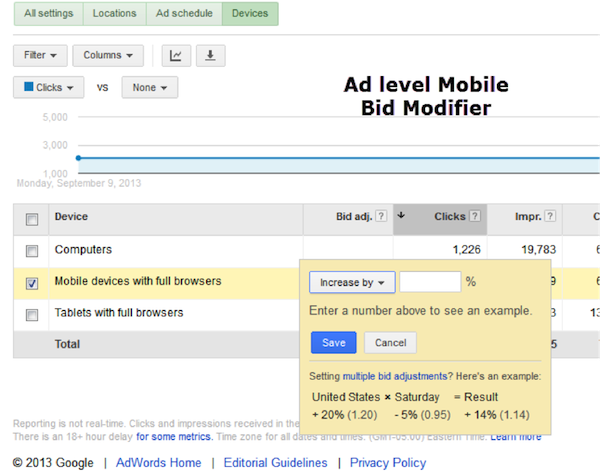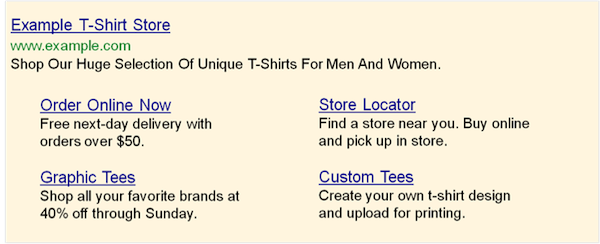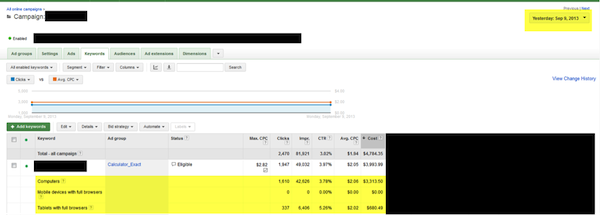Enhanced Campaign features have been available in beta since February, yet as with many new technologies, learning the ropes can be a big effort, especially given all the of the recent changes to SERPs over the last 18 months. What started as a perceived loss of granular controls by device has turned into greater front-end efficiency and back-end revenue, which were previously lost by not having the ability to target at the device level.
Maximizing performance and improving efficiencies with Enhanced Campaigns requires five simple steps. Let’s look at how you can gain a better understanding and increase revenue with Enhanced Campaigns.
1. Mobile Optimized Ads
These were arguably one of the most touted features of enhanced campaigns. In effect, this capability was available pre-enhanced campaigns, by targeting campaigns at the device level. However, many advertisers without mobile-ready sites chose not to run mobile. Among those advertisers who did, little attention was paid to optimizing copy for based on device. With an attention to user based intent and a refresh of copy for mobile optimized ads, there have been dramatic increases to mobile CTR and conversions that were formerly left on the table by advertisers not opting in, or optimizing based on users intent by device.

Tip: Although a mobile optimized site or responsive design is most ideal, advertisers should think twice before implanting tactics that opt them out of mobile search if they don’t have a mobile friendly site, because they could be leaving revenue on the table. With a refined campaign strategy focused on user intent, you can deliver a user experience that captures the demand without besmirching the brand.
2. Keyword-Level Mobile Bid Control
As with most search campaign optimizations, keyword-level mobile bidding also starts with structure. Restructuring campaigns into single-keyword ad groups allows for ad-group level mobile bid modifiers that apply down to the individual keyword level. While this still doesn’t mitigate the loss of keyword-level bid control on tablet devices from the enhanced campaign transition, for advertisers who experience huge variances in conversion rate and efficiency levels across the different device types, any amount of device-level control regained is valuable.

Tip: Although a single keyword per group might not seem scalable, it is best suited for small to mid-sized advertisers or keyword asset clusters with historical mobile conversion rate levels significantly lower than that of desktop and tablet, and/or without a mobile site.
3. Enhanced Sitelinks
Where Google gives, it also takes away – but not in the case of enhanced sitelinks. With this feature, Google has provided more flexibility and control by allowing edits to the links, versus a removal of text from relevant ads in the campaign. This is a great way to provide additional detail around the link itself and will take your potential customers deeper into your site.

Tip: You can load in up to 6 sitelinks, but only 4 typically show. Experience shows the same success as mentioned on the AdWords blog, where click through rates were significantly higher than the same ad with traditional 2- and 3-line sitelinks.
4. Geo-Bidding
One of the most exciting new features with Enhanced Campaigns is geo-bidding, as it provides the most opportunity from both an efficiency and conversion standpoint. There are all kinds of ways to slice and dice the enhanced geo feature, but it starts with having a depth of knowledge about the overall business you are advertising for.
If your budget isn’t allocated differently by location but you see conversion differences based on location, the ability to apply a bid modifier versus having to breakout into a new campaign saves a lot of time. For retailers who are driving users to their brick and mortar stores, you can really perfect a drive to store campaign by using personalized ad copy, spend during the hours where the store is open and modify bids at both the mobile and geo level. Experience shows that by offering mobile users who are in close proximity to a store, an in-store promotion redeemed right from the landing page, a vastly improved conversion – increasing customer and margins because there is no longer a need for blanket promotions but rather tailored offers based on best customer and their purchase intent.
Tip: Hound your Google representative for a heatmap and analysis showing SOV, average position, and CPC throughout the territory you’re targeting so you can begin considering how best to utilize the new geo-bidding features.
5. “Opt-Out”
If you are still skeptical and think that Enhanced Campaigns are a ploy to monetize your spend, well you can still have your mobile campaigns. However, heed the warning that this is an imperfect and a dubious strategy – do not fall into the trap clinging to your old ways.

Tip: Set your mobile modifier to +300 percent and reduce your bids to 25 percent of their current levels. Monitor traffic to the campaign by device and adjust bids down as necessary. Consider making a Keyword ID mapping sheet between desktop keywords and mobile keywords so after natural bid adjustments, you can drop the proper mobile keyword 15 percent or further below the desktop keyword bid level.
Early adopters may have the inside scoop on these changes, but it’s definitely not too late to take advantage of Enhanced Campaigns using the tips listed above. Jump on in, the water’s fine!



